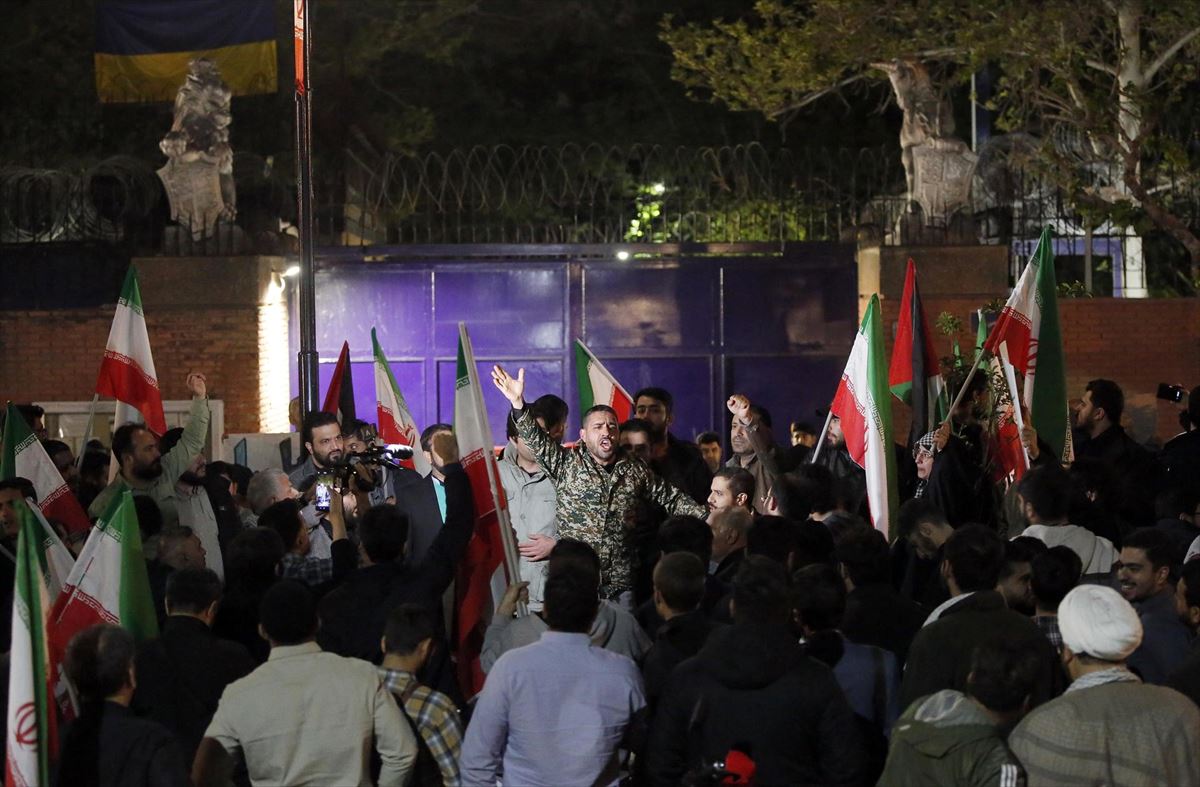Tel Aviv’s military alliance with the US facilitates the shooting down of almost all projectiles, although a base in southern Israel suffers damage. Hezbollah has at the same time attacked northern Israel.
Iran had been promising “punishment” against Israel for days in response to the April 1 attack on the Iranian Consulate in Damascus, and finally made good on its threats late on Saturday, with a massive action with drones and missiles that is unprecedented and which raises the tension between these two historical enemies to the maximum, opposite poles of a Middle East that has been on guard for months.
The Israeli authorities had been preparing for what seemed inevitable for some time, and even before the attack was confirmed, they suspended classes and limited the right to assembly. Shortly after, the Israel Defense Forces (IDF) confirmed that the attack had begun, speaking from the beginning of “dozens” of drones, although the Revolutionary Guard later clarified to also include missiles among the projectiles launched.
The spokesman for the Israeli Army, Daniel Hagari, has confirmed that, in total, they have been more than 200 projectilesalthough the majority of them would have been intercepted outside Israeli territory.
Hagari has reported damage to a military base in southern Israelalthough he has stated that they are not serious.
Israel bombs Iranian consulate in Damascus, killing two generals of Iran’s Revolutionary Guard
The official Iranian agencies have placed special emphasis on the impacts on these facilities, emphasizing that they served as a base to launch the bombing against the Consulate, although the images most widely disseminated in these media have been those of the projectiles flying over some of the most emblematic of Jerusalem.
Israel will not sit idly by
The Government of Iran has appealed to its right to self-defense to justify the action and its delegation to the UN has gone so far as to say that, for them, this exchange of attacks can be considered “concluded”, in a veiled call to Israel to refrain from a counter-reply.
However, Israeli Prime Minister Benjamin Netanyahu has already stopped any speculation as soon as the drone and missile launches occurred to point out, on the one hand, that Israel is “strong” and had been “preparing” for the “direct attack” and, on the other, that he will not sit idly by.
“I have set a clear principle: whoever hurts us, we will hurt them. “We are going to defend ourselves from any threat and we are going to do it calmly and determinedly,” warned Netanyahu, who has assembled the war cabinet to study what this response may be.
US Defense
Israel’s main international supporter, the United States, has once again come to its defense, both politically and militarily. US President Joe Biden mobilized as soon as he heard the news and summoned his main security team to the White House to make it clear that support for Israel is “strong”, regardless of the discrepancies of recent months.
In fact, North American forces have directly participated in the shooting down of some of the Iranian projectiles, as Biden himself confirmed after speaking by phone with Netanyahu.

United Kingdom It has also confirmed a mobilization of its teams “in response to the escalation in the region and in collaboration with allies.” The British Defense Minister, Grant Shaps, has announced the deployment of more military aircraft in the area, ready to “intercept air attacks within the scope of the missions” already in force, aimed mainly at containing terrorism in Iraq and Syria.
All this despite the fact that Tehran has issued warning messages against countries that may come to the aid of Israel at these key hours, for example by facilitating its airspace or the use of its territory to launch some type of attack against Iran. The Iranian Revolutionary Guard has pointed the finger directly at the United States, a country it has called on in a note not to interfere or to stick to a “forceful” response.
Hezbollahfrom Lebanon, has launched dozens of Katyusha rockets against northern Israel coinciding with the Iranian attack, although it has not linked both events in its statement, collected by the Al Manar network.
Emergency meeting of the UN Security Council
Western leaders such as the President of the European Council, Charles Michel, the British Prime Minister, Rishi Sunak, and the German Chancellor, Olaf Scholz, have clearly condemned the Iranian attack, while calling for general containment. The Secretary General of the UN, António Guterres, has been “deeply alarmed” by the “very real” risk of there being a “devastating” increase in tensions throughout the Middle East, which is why he has called for a cessation. “immediate” hostilities.
The United Nations Security Council will hold an emergency meeting this Sunday requested by Israel and, as announced by Biden, the leaders of the G7 They will also have a meeting in search of a “united diplomatic response” to the latest challenge from the ayatollah regime.
Source: Eitb
I am Michael Melvin, an experienced news writer with a passion for uncovering stories and bringing them to the public. I have been working in the news industry for over five years now, and my work has been published on multiple websites. As an author at 24 News Reporters, I cover world section of current events stories that are both informative and captivating to read.
